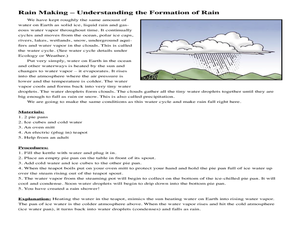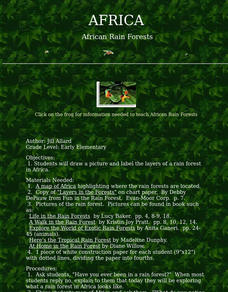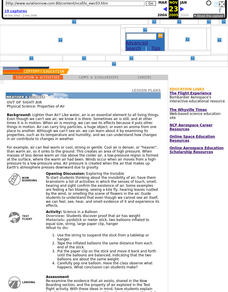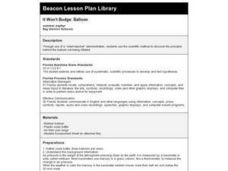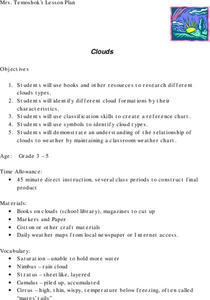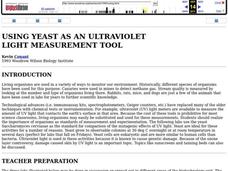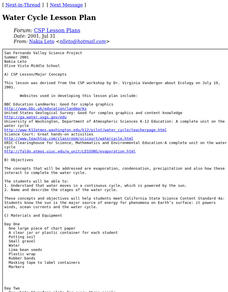Curated OER
Rain Making - Understanding the Formation of Rain
Students read and conduct and experiment to learn about rain formation. In this water forms lesson, students read about the formation of rain and its purposes. Students then complete a rain experiment activity.
Curated OER
Weather Around the World
Young scholars learn a few key weather terminology and a variety of climates through examining and recording weather characteristics in a variety of communities around the world.
Curated OER
African Rain Forests
Learners draw a picture and label the layers of a rain forest in Africa.
Curated OER
Out Of Sight Air; Weather
Fourth graders conduct an experiment to get them thinking about the invisibility of air, and to prove that air has weight.
Curated OER
Loss of Wetlands: Subsidence
Learners observe subsidence and the effect it has on wetlands with a classroom demonstration. They think about the impact of global warming and the sea level and how it affects the marsh.
Curated OER
It Won't Budge: Balloon
Eighth graders use the scientific method to discover why a balloon is not inflated.
Curated OER
Weather Records
Students write newspaper articles using a "weather record" worksheet and information they find in newspapers.
Curated OER
Spectral Surprise
Students experience a model that produces, separating, and displaying spectral colors.
Curated OER
Decomposers at Work!
Students design and conduct investigations that illustrate the process of decomposition. After a lecture/demo, students simulate the process of soil composting in the classroom. They closely chart the decomposition of their soil.
Curated OER
Just Jelly
Students identify common gelatinous zooplankton in the Canada Basin and their ecological role. They compare and contrast feeding strategies of at least three different types of gelatinous zooplankton.
Curated OER
Physical Characteristics of the Troposphere
Students examine troposphere graphs and mcompare their hypotheses with data collected by weather balloons launched from the NOAA ship, Ronald H. Brown. they write summaries about the physical properties of the troposphere.
Curated OER
Clouds
Students explore the characteristics of clouds, their formation, symbols used in their identification, and the relationship of clouds to weather. The lesson focuses on how they are formed and their classification.
Curated OER
Weather Myths
Fourth graders examine myths that are based on weather phenomenon. They write, illustrate and present an original weather myth.
Curated OER
Agriculture, Weather, Economy and Indiana
Fourth graders, in groups, investigate the role of weather in Indiana's farming economy. They make a prediction as to weather and its effect on the economy of Indiana. They present their data using a media presentation of data...
Curated OER
Weather Where We Are
Students investigate the reports of local weather. They identify types of weather data and correlate it to the conditions. Using the data students draw a picture of the current weather. They conduct the same investigation for all four...
Curated OER
Aerology- The Study of Mars
Students investigate various aspects of the planet Mars. They examine a core sample that is simulated to make observations. Then compare the known sample with one that is unknown and differentiate between the two. Students hypothesize...
Curated OER
Measuring Angles
Third graders describe an amount of turn from a particular position to another using the 'circular' benchmarks of 0, ++, ++, ++, and full turn. Estimation language such as 'just about', 'between', 'not quite', 'just over', and similar...
Curated OER
Using Yeast as an Ultraviolet Light Measurement Tool
High schoolers accurately measure the relationship between radiation dose and either survival or some genetic event such as mutation or recombination. They investigate the damage that was done to the DNA molecule as a result of exposure...
Curated OER
Is Your Water Clean?
Students conduct tests of water samples from different sources, such as a local river, tap water, and an irrigation ditch. After determining which pollutants are present in each sample, students hypothesize the possible sources of the...
Curated OER
The Sounds of Summer
Students experiment with measuring the speed of sound in an open field by clapping hands and measuring the time delay between the clap and hearing the sound at a long distance. Students practice solving equations at completion of activity.
Curated OER
What does AG have to do with me?
Students practice alphabetizing while categorizing sources of basic agricultural products. They discuss agricultrual products, discover where they are grown and draw a simple agricultural scene on poster board.
Curated OER
Hottest, Coldest, Highest, Deepest: Science, 4th Grade
Fourth graders investigate weather patterns in their home state of Utah. After creating KWL charts, they research weather and geographical data to locate the state's extremes. As an extension, 4th graders write and illustrate books about...
Curated OER
Atoms, Kinetic Theory, Solids and Fluids
Students identify and describe the building blocks that make up an atom. They also compare the ages of atoms to the ages of the materials they compose,as well as, give examples that illustrate the small size of atoms.
Curated OER
Water Cycle
Learners identify and define evaporation, condensation, precipitation and also, how these interact to complete the water cycle. They identify that water moves in a contimuous cycle, which is powered by the sun. Finally, students name...


